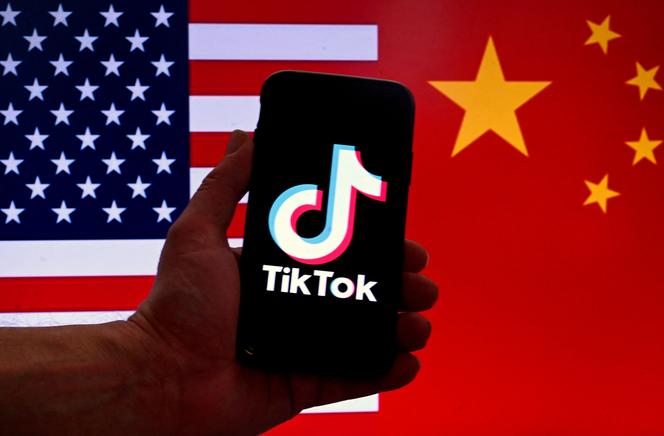


Toward a takeover or a ban? On Tuesday, April 23, the US Congress passed a law forcing Chinese company ByteDance to sell its flagship social media platform, TikTok, or face a ban on the video app in the US. Passed at the same time as a legislative package devoted to aid for Ukraine, Israel and Taiwan, the bill is the most concrete threat to the Chinese platform in the US since former president Donald Trump's executive order banning it in 2020, which was dropped a year later.
The US has been trying to get rid of TikTok for the past four years. The Chinese app, owned by the company ByteDance, is seen by many American political leaders as a threat to the country's users. FBI director Christopher Wray, for example, said on Tuesday in an interview with NBC that the app was "a national security threat." At issue is the Chinese government's alleged ability to use the app to spy on American citizens or influence their opinions.
So far, the US authorities have provided little concrete evidence to back up their accusations. In December 2020, however, ByteDance admitted that some of its employees had been able to track journalists using data from the app.
All that remains is for the bill passed on Tuesday to be signed by President Joe Biden, who has pledged to do so quickly. ByteDance will then have 270 days (around nine months) to sell TikTok to a non-Chinese owner, with a possible 90-day extension in the event of "significant progress," according to the Washington Post.
The deadline now comes after the US presidential election on November 5 (in its previous version, the bill provided for a shorter deadline of 180 days). After this deadline, if no buyer has been found, the application will be banned within the US.
So far, no obvious candidate has emerged for the takeover of the video app, which is expected to be worth more than $100 billion (almost €93.6 billion), according to the Wall Street Journal. Several well-known names from the business world have expressed interest, including Steve Mnuchin, Trump's former treasury secretary, who announced that he is putting together a consortium of investors for this initiative. Activision CEO Bobby Kotick has also approached wealthy investors with a similar aim, according to reports in the Wall Street Journal. However, no firm offer has yet been made public.
The price of a possible sale also depends on the Chinese government. Chinese law strictly regulates the export of technology, particularly algorithms. Beijing may decide that the sale of TikTok will not include the social media platform's recommendation algorithms, which would greatly diminish its interest and value.
ByteDance has already announced that it will challenge the law in US courts. "We will keep fighting," wrote Michael Beckerman, TikTok's head of public policy in the US, in an internal memorandum consulted by the US press. "This is the beginning, not the end of this long process."
An initial appeal concerning how the law potentially violates the freedom of expression of the app's American users seems more than likely. According to most experts, such an appeal would have a reasonable chance of success. In November, for example, a law banning TikTok in the state of Montana was blocked by a federal court, which ruled that the law was likely to violate the First Amendment of the US Constitution, which protects freedom of expression.
Technically, ByteDance could also choose to shut down access to its app for US users. If it does, it will lose its biggest market, which includes 170 million users.
The text of the law concerns all the apps produced by ByteDance, including the very popular video editing app CapCut and another less popular social media app, Lemon8. In theory, however, its very broad wording covers most apps controlled by an entity operating from "a foreign adversary country" of the US.
According to Axios, the legislation drafters made sure that online sales apps such as Temu and Shein would not be affected. However, the law adopted broad and imprecise formulations. For example, it excludes from its scope any "application whose primary purpose is to allow users to post product reviews," a notion open to interpretation.
For years, TikTok has maintained that it has no links whatsoever with the Chinese Communist Party and that it has taken every measure to ensure the security and privacy of its American users. Its executives regularly point out that the application is different from Douyin, the one available in China, and that it respects US laws and applies specific moderation rules. Above all, the company certifies that all its US users' data is stored in the US and inaccessible to Chinese authorities. The company has built gigantic dedicated data centers across the Atlantic, an important part of what it refers to as "Project Texas."
In a message to its users posted in mid-March, TikTok CEO Shou Chew furthermore felt that one of the unstated aims of the law was to strengthen "a handful of other social media companies" – an allusion in particular to Meta (Instagram, Facebook and Threads).
The Chinese Ministry of Foreign Affairs has repeatedly denounced the "double standards" of the anti-TikTok bill. In a long communiqué published in March, the Chinese government denounced "restrictions on free speech" in the US and accused Washington of being one of the world's leading disseminators of propaganda and disinformation. China bans all the major American social media platforms within its territory, including Instagram, Facebook and X.
Translation of an original article published in French on lemonde.fr; the publisher may only be liable for the French version.
